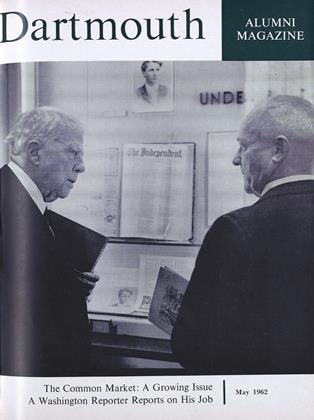By Robert Frost '96.New York: Holt, Rinehart & Winston,1962. 101 pp. $4.00.
DEAR ROBERT FROST:
Through the ALUMNI MAGAZINE I send you this letter, taking a cue from your dedication, to dispose of as you please. ... Was it luck or cunning, I wonder, which delayed publication of A Boy's Will until you were nearly a mature forty, after you had torn up or burnt the confusions, if any, of an unwasted youth? So many of your contemporaries have failed to fulfill their early promise (especially the novelists); got stuck on one note, or tapered off in their middle years, while for you a clear line has run from the first page of A Boy's Will to the last of In the Clearing:
They would not find me changed from him they knew Only more sure of all I thought was true.
(Curious and not irrelevant: the same may be said of another octogenarian of our time; a clear line runs from the twenty-six-year-old author of the Ruritanian romance, Savrola, to England's greatest Prime Minister.)
The swinger of birches still peers out beneath your white hair. You've become, perhaps because of your platform appearances before so many thousands of your fellow-citizens, more and more playful: a cosmic jester, the court jester of Demos, too. He who runs may read:
It takes all sorts of in and outdoor schooling To get adapted to my kind of fooling.
"This is not altogether fool, my lord" - you're still as much at home on the heath as on the steps of the Capitol.
And equally at home with Presidents and scientists. In fact you might have been a scientist. Take "Pod of the Milkweed," for example (as rich in texture, by the way, as anything of your last fifty years). There's the exact observation:
And yes, although it is a flower that flows With milk and honey, it is bitter milk, As anyone who ever broke its stem And dared to taste the wound a little knows.
The curious, questing mind - I have never thought of tasting the wound! And the speculation - the "freedom to flash off into wild connections":
The milkweed brings up to my very door The theme of wanton waste in peace and war As it has never been to me before.
A playful scientist, it's true, playing with shells, atoms,, galaxies as well as with words. No wonder you and Niels Bohr found you talked the same language.
Was it luck or cunning? The question Samuel Butler posed about evolution, you answer about love and religion:
Grant me intention, purpose, and design That's near enough for me to the Divine.
Our best guide upward further to the light Passionate preference such as love at sight.
But I don't need to tell you about yourself; anyway, Philip Booth has done that recently better than I could. You've often said that the figure a poem makes begins in delight and ends in wisdom. For your last book let's put it the other way: begins in wisdom and ends in delight. In delight and - I'd add for our jittery age - in serenity.
Yours for "yet another blow,
 View Full Issue
View Full Issue
More From This Issue
-
 Feature
FeatureCOMMON MARKET
May 1962 By WALDO CHAMBERLIN -
 Feature
FeatureA Reporter in Washington
May 1962 By ERNEST L. BARCELLA '34 -
 Feature
FeatureSGT. BROWN'S RUGGED BOYS
May 1962 By CLIFF JORDAN '45 -
 Feature
FeatureThe Dictionary's Function
May 1962 By PHILIP B. GOVE '22 -
 Feature
FeatureDartmouth in the Public Service
May 1962 -
 Feature
FeatureMUSIC ADVISORY GROUP TO AID HOPKINS CENTER
May 1962
STEARNS MORSE
-
 Books
BooksProse Preferences.
NOVEMBER 1927 By Stearns Morse -
 Books
BooksANONYMOUS FOOTSTEPS
February 1933 By Stearns Morse -
 Books
BooksTHE AMERICAN NOVEL AND ITS TRADITION.
December 1957 By STEARNS MORSE -
 Books
BooksYOU COME TOO: FAVORITE POEMS FOR YOUNG READERS.
December 1959 By STEARNS MORSE -
 Books
BooksTHE LETTERS OF ROBERT FROST TO LOUIS UNTERMEYER.
JANUARY 1964 By STEARNS MORSE -
 Books
BooksSELECTED LETTERS OF ROBERT FROST.
DECEMBER 1964 By STEARNS MORSE
Books
-
 Books
BooksFACULTY PUBLICATIONS
July 1919 -
 Books
BooksFORESIGHTS IN COLLECTIVE BARGAINING.
January 1947 By C. E. Dankert. -
 Books
BooksFACULTY PUBLICATIONS
February 1925 By Hewette E. Joyce -
 Books
BooksTHE PAPERS OF DANIEL WEBSTER. CORRESPONDENCE, VOLUME I.
January 1975 By JOHN SLOAN DICKEY '29 -
 Books
BooksTHOMAS B. REED; PARLIAMENTARIAN
February, 1931 By Leon B. Richardson -
 Books
BooksGETTING ACQUAINTED WITH GOD
JANUARY 1929 By R. B. Chamberlin

